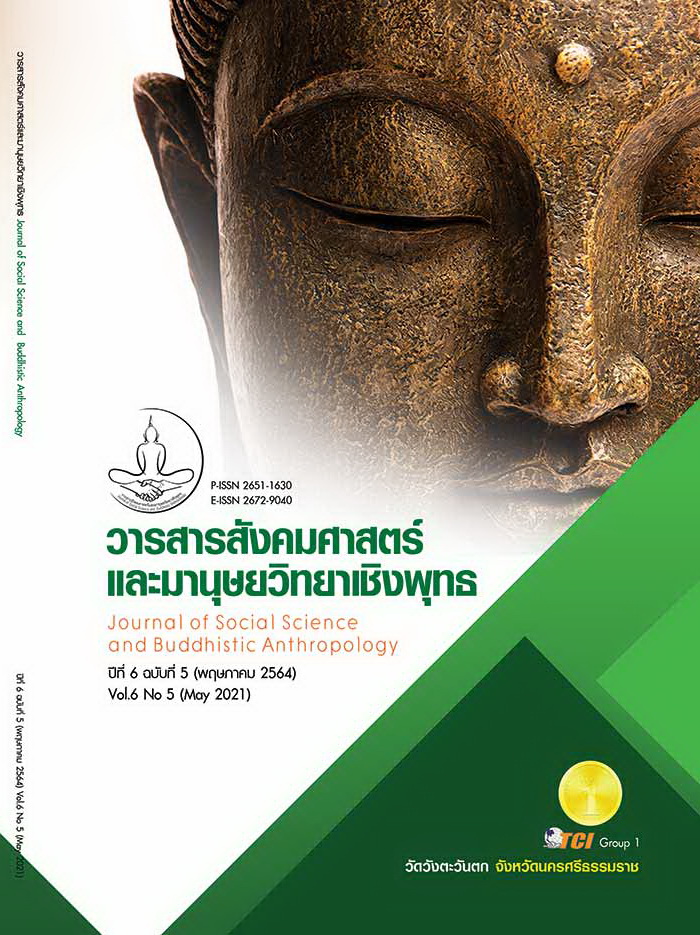DEVELOPMENT OF LEARNING APPLICATIONS TO PROMOTE THE DESIRABLE TRAITS OF LEGAL PROFESSION
Keywords:
Desirable Characteristics, Legal Profession, ApplicationAbstract
The Objectives of this research article were to 1) To develop learning applications to promote the desirable traits of the legal profession; 2) to compare the desirable traits of the legal profession between before and after study by application; 3) To investigate the correlations of desirable traits of the legal profession and frequency of access. It is an experimental research. The samples used to study the results of promoting the desirable traits of the legal profession were selected by volunteer selection from 42 people who downloaded the application. The research instruments were the desirable traits of the legal profession test and the applications performance Assessment. The data were tested normality and analyzed by mean, standard deviation, t - test, and Pearson‘s Correlation. The research was divided into two major phases: phase 1 related to the development of learning application designed for promoting the desirable traits of the legal profession, and phase 2 related to the investigation of learning outcomes obtained from the implementation of learning applications designed for promoting the desirable traits of the legal profession. The findings of the study revealed that 1) The assessment on quality of the application from the experts was at “very good” level; 2) the desirable traits of the legal profession; ethics, morality, legal professional ethics, fundamental working skills and legal knowledge of experimental group showed that the post - test scores was significantly “higher” than the pre-test scores at the level .01; 3) In terms of the correlations of desirable traits of the legal profession and the frequencies of accessing learning applications, it showed that the experimental group’s frequent use of accessing learning applications directly affected better improvements for the desirable traits of the legal profession.
References
กนกรส คำใบ. (2559). การพัฒนารูปแบบการเรียนการสอนผ่านเว็บด้วยโครงงานเพื่อพัฒนาการคิดอย่างมีวิจารณญาณ สำหรับนักเรียนชั้นมัธยมศึกษา. ใน ดุษฏีนิพนธ์ศึกษาศาสตรดุษฎีบัณฑิต สาขาวิชาเทคโนโลยีการศึกษา. มหาวิทยาลัยรามคำแหง.
ชาญชัย แสวงศักดิ์ และวรรณชัย บุญบำรุง. (2543). สาระน่ารู้เกี่ยวกับการจัดทำประมวลกฎหมายของต่างประเทศและของไทย. กรุงเทพมหานคร: นิติธรรม.
ณัชณิชา โพธิ์ใจ และวารีรัตน์ แก้วอุไร. (2562). การพัฒนาหลักสูตรเสริมสร้างคุณลักษณะด้านความรับผิดชอบตามแนวคิด คุณลักษณะศึกษาของลิคโคนา สำหรับนักเรียนชั้นมัธยมศึกษาตอนต้น. วารสารศึกษาศาสตร์ มหาวิทยาลัยนเรศวร, 21(3),61-72.
พงศ์นรินทร์ เลิศรุ้งพร. (2556). การพัฒนาระบบการจัดการเรียนการสอนสำหรับคอมพิวเตอร์พกพาแบบหน้าจอสัมผัส. วารสารวิชาการครุศาสตร์อุตสาหกรรม พระจอมเกล้าพระนครเหนือ, 8(1), 63-71.
พีร์ พวงมะลิต และคณะ. (2559). คุณลักษณะที่พึงประสงค์ของนักศึกษาหลักสูตรนิติศาสตร์ในการฝึกประสบการณ์วิชาชีพกฎหมาย. วารสารบัณฑิตศึกษา มหาวิทยาลัยราชภัฏวไลยอลงกรณ์ ในพระบรมราชูปถัมภ์, 10(3). 99-111.
สวนันท์ แดงประเสริฐ. (2560). การพัฒนาระบบการจัดการเรียนการสอนที่ปรับเปลี่ยนการแสดงผลตามขนาดหน้าจอ. วารสารพัฒนาเทคนิคศึกษา, 9 (103), 19-26.
Apple Inc. (2020). Swift. A powerful open language that lets everyone build amazing apps. Retrieved December 20, 2020 From https://www.apple.com/swift/
Dangprasert, S. (2021). Effects on Using Tutoring Application in Integration with Self-Directed Learning to Improve Statistical Analysis Skills. TEM Journal, 10(1), 63-68.
Likert, R. (1967). The Method of Constructing and Attitude Scale. New York: Wiley & Son.
Patel, S. & Burke-Gaffney, A. (2018). The Value of Mobile Tablet Computers (iPads) in the Undergraduate Medical curriculum. Advances in Medical Education and Practice, 92018), 567-570.









